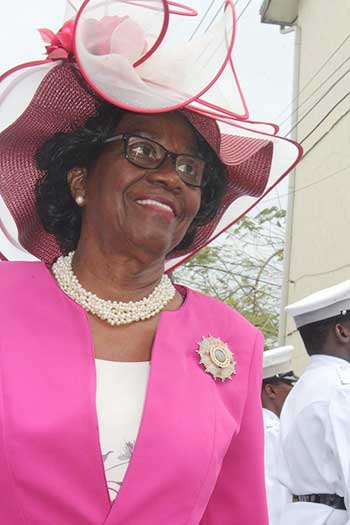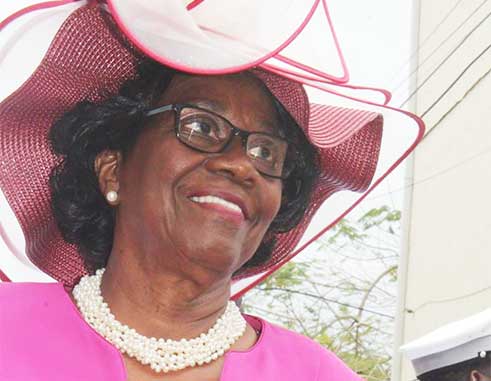Address by Governor General Dame Pearlette Louisy
PRESS RELEASE – AS we bring the curtains down on this year’s Blindness Awareness Month, I would like to express my sincerest thanks on behalf of the Saint Lucia Blind Welfare Association, to all partners, benefactors and members of the public, for their support during the past year and during this month’s programme of activities.

The year 2016 has been described by the Association’s management team as one of its most challenging years to date. Little wonder then that it chose as its theme for this year’s observance, the stark and simple reality: “Blindness Awareness: We Need Your Help”. No euphemisms, no pussy-footing around the truth, no gilding of the lily, no couching of the situation in delicate diplomatic language; just the plain unadulterated truth. The Association needs help; it needs your help, and it needs it urgently. The appeal is clear; “crystal clear”, we might say.
The Saint Lucia Blind Welfare Association is one of those agencies that cannot be criticised for not helping itself, or faulted for not ensuring that it remains relevant. Indeed, judging by the number of persons who now access its many services, we can say today, without any fear of contradiction, that the stigma that was traditionally associated with blindness and those afflicted with blindness has all but disappeared. The perception of “welfare” has now given way to “service” – easily accessible service at nominal or no cost to all persons, irrespective of social or economic status, who are living with blindness, low vision or other forms of visual impairment.
The Association describes itself as “an organisation with vision”. And justifiably so. For vision is not only the act or faculty of seeing things with the physical eye, but also the faculty of perceiving things, present or future, through the mind’s eye, through our imagination. Over the course of the past forty-four years, the Association has been able to transform itself from a sheltered school and workshop for the blind to a dynamic organisation offering diversified services to the blind and visually-impaired. It is an impressive list of services, not one to be scoffed at. These services include:
• The education service which provides integrated education for the blind and visually- impaired students in regular schools alongside their sighted peers;
• The Eye Care Clinic which offers full, comprehensive, high-quality eye care services with a well-trained team, including an in-house Optometrist and Ophthalmologist;
• The Eye Health Programme which addresses the whole spectrum of vision, from normal vision to total blindness, focussing on awareness, prevention, training, screening, assessments and low vision services.
• The Kids Insight Project providing eye examinations, surgeries, glasses, low vision aids and training for children with blinding eye conditions. This year, the team from the West Virginia University Eye Institute, which has been partnering with the Association for the past fourteen years, was able with the assistance of local professional and ancillary staff and volunteers, to examine and treat over two hundred children and adults – yes, adults, too – and to perform over sixty eye surgeries;
• A National Diabetic Retinography Screening and Treatment Programme. I am sure that most, if not all of Saint Lucia, have heard by now the public service announcements on the local airwaves, urging you to do the screening if you are suffering from diabetes;
• In another partnership with the West Virginia University Eye Institute, the SLBWA is pleased to be able to benefit from the Glaucoma Selective Laser Trabeculoplasty Study – the SLT for short – which offers laser treatment to glaucoma patients of Afro-Caribbean descent. Over a hundred Saint Lucians have been treated under this project;
• The Rehabilitation and Technical Adjustment to Blindness Programme which provides technical adjustment to blindness and self management skills. From October 2016, the Association has to date held training workshops for forty-five community care workers to assist in the implementation of this rehabilitation programme. Unfortunately, it has had to suspend this badly-needed support programme because of cut-backs to the National Initiative for Creating Employment (NICE) programme which was the main sponsor of the community caring service for home-bound citizens, many of whom are blind or severely visually-impaired. The search for alternative funding to enable the Association to continue this all-important rehabilitation service is currently one of its greatest challenges.
Ladies and gentlemen, I am sure that you will agree with me that the Saint Lucia Blind Welfare Association, together with its partners, the Caribbean Council for the Blind, Sight Savers International, the West Virginia University Eye Institute, The Queen Elizabeth Jubilee Trust Fund, and the Lions Clubs of Saint Lucia, deserve the highest commendation for sustained advocacy, effective leadership and creativity. But as I mentioned earlier, they do need your help, as they themselves admit that “there is still a long way to go.”
While 2016 was a very challenging year, there were many positive initiatives which we would like to share with you. One was a six-week reflexology training course for six blind and visually-impaired women, which was funded by Sunswept Resorts. The training, which was held at The Body Holiday Resort, was facilitated by a certified instructor from the United Kingdom. We are pleased to report that all were awarded certificates upon completion and that three have been absorbed by The Body Holiday as full-time therapists. We express our heartfelt appreciation to the management of Sunswept Resorts.
Another was the attendance of Miss Jessica Jacobie at an international workshop in Canada in April this year at the invitation of the World Blind Union. This workshop was geared towards the training of a group of potential young leaders from around the world to advocate for the ratification of the Treaty of Marrakesh. This is a treaty which aims to guarantee people with blindness and vision impairment unconditional access to all print materials. The trained advocates will be required to lead a campaign for ratification of the treaty by their respective Governments. Blind and visually-impaired citizens of countries which ratify the Treaty will be automatically exempted from copyright conditions.
I urge you, therefore, to rally behind Jessica and the Association as they campaign for ratification, and I call on the Cabinet of Ministers to place this issue high on its legislative agenda, to give our blind and visually-impaired students the very best chance for success. Indeed, in this year’s Throne Speech, we did speak to paying special attention to our special needs students, to creating the enabling environment that will allow them to reach their fullest potential. Unconditional access to all print material is an opportunity not to be missed. Our Ministry of Education will also be asked to accept the new international Braille code.
The National Telecommunications Regulations Commission made a significant donation of equipment to the Association. The equipment included desktop computers, laptops and other assistive devices which have been assigned to students and staff. These have strengthened capacity to deliver the Association’s education, eye health and administrative services. Thanks to the NTRC for this assistance and to the Ministry of Education for facilitating it. On a related note, we thank the Ministry of Education for their tremendous assistance in providing the conducive environment in which our blind and visually-impaired students were able to write their examinations during this current school year. Your efforts were very much appreciated.
We welcomed, too, the visit last month of two ocularists, Mr. Chris Antonini and Mr. Phil Bowen, who made and fitted prosthetic eyes and shells for over twenty of our patients who had been referred by the Kids Insight 2017 team and by our local Opthalmologist, Dr. Darra Burt. To them, we express sincerest thanks.
It would be remiss of me if I did not, before I close, extend the Association’s congratulations to Ms. Rebecca Coakley of the Kids Insight Project for receiving the Migel Medal – the highest honour bestowed on a professional or volunteer whose dedication and achievements improve the lives of people who are blind or visually-impaired.
Since the inception of the Kids Insight Project in Saint Lucia in 2003, Ms. Coakley has spent over a year of her life with us. She is known as the child whisperer and is loved for her passion, love and total commitment to our children. She has not only touched but changed the lives of thousands of them over the past fourteen years. We thank her for her significant and selfless contribution. It would appear, though, that her work in the region has only just begun, as the Caribbean Council for the Blind has asked West Virginia University to extend the Kids Insight Programme to Antigua and Barbuda and Jamaica. She will, therefore, be making a first technical visit to Antigua next month, accompanied by our own Eye Health Officer, Mrs. Denise Godin. We wish them well.
I close, ladies and gentlemen, with the appeal contained in this year’s theme, “Blindness Awareness: We need your help”, and urge you to take it seriously. Mr. Anthony Avril, the Association’s long-serving Executive Director, invites you to be part of the vision, to help save the vision of our people. You can help by participating in the drive for the elimination of avoidable blindness by the year 2020 – three short years from now – and by helping to empower those whose sight cannot be restored with necessary tools and skills for life. It is amazing how little it takes to make a real difference. For those of us who are still blessed with the gift of sight, Mr. Avril has this piece of advice for us: “Your eyes are for life: take care of them.”
Thank you, ladies and gentlemen. Thank you all.





![Simón Bolívar - Liberator of the Americas [Photo credit: Venezuelan Embassy]](https://thevoiceslu.com/wp-content/uploads/2025/12/Simon-Bolivar-feat-2-380x250.jpg)



